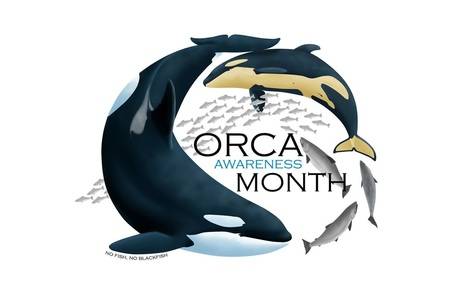Submitted by Orca Salmon Alliance
In conjunction with Governor Inslee’ Orca Recovery Task Force in Wenatchee, the Orca Salmon Alliance will deliver over 43,000 signatures of support for bold, effective and measurable actions for orca recovery. The group will meet at 12:30 p.m., Aug. 7 at the Confluence Technology Center, located at 85 Technology Center Way, Wenatchee.
The broad and deep public support was generated during Orca Awareness Month in June. This year marks the 12th year that Washingtonians celebrated Orca Awareness Month. Started over a decade ago by Orca Network, Orca Awareness Month brings together our Pacific Northwest communities to draw attention to the plight of the endangered Southern resident orcas and inspire action to recover them to a healthy population. Orca Recovery Task Force Cochairs Stephanie Solien and Les Purce will accept the 43,000 public comments and signatures on behalf of Gov. Inslee.
“Even before the heartbreaking news of J35’s deceased calf, the public is in full support of and expecting Governor Inslee and the Orca Recovery Task Force to take bold, creative solutions in order to begin implementing near-term, truly effective actions immediately,” said Orca Salmon Alliance. “Southern Resident orcas are icons of Washington State, they are critically endangered, they are starving for lack of salmon, and without leadership and bold action, we will lose these orcas forever.”
“Sound the alarm for orcas” statement of support by the public:
Orca Recovery Task Force Members:
We, the undersigned, urge the Orca Recovery Task Force to develop significant policy and program recommendations that will support meaningful actions to recover Southern Resident orcas. It is imperative that the Task Force addresses the following issues identified by the Orca Salmon Alliance to prevent the extinction of Southern Resident orcas:
· Prioritize and accelerate salmon habitat restoration and fish-barrier removal projects that will most benefit orcas.
· Explore and support near-term actions that would increase chinook salmon productivity and survival in the Columbia River basin by maximizing beneficial spill at the lower Snake and Columbia River dams.
· Increase and secure funding for pollution prevention and clean-up programs.
· Identify and commit to meeting an ecologically relevant noise reduction goal.
· Develop recommendations to reduce the risk of an oil spill and improve safety measures for oil transportation.
· Recommend that the state create a permanent position for an Orca Recovery Coordinator to manage, direct, and coordinate ongoing recovery efforts.
The Task Force must be guided by an overall goal of growing and managing healthy, resilient, connected, and functional ecosystems. Continued and expanded reliance on technologies and human interventions – rather than on functional ecosystems – will be unlikely to meet the needs of salmon, orcas, or people.
For more information, visit www.orcasalmonalliance.org.



